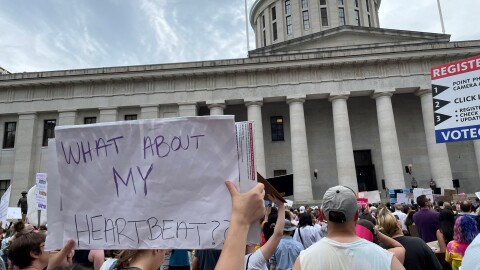Cleveland prosecutors won’t bring criminal charges for violations of Ohio abortion bans, and investigating such cases will be the lowest priority for city resources, Mayor Justin Bibb and city council announced Monday.
Bibb will also work with Cleveland City Council to set up a $100,000 fund to pay for lodging and travel for residents or employees who obtain legal out-of-state abortions, his office said.
The announcement is the latest move by a local Democratic official to support abortion access and minimize prosecution under the state’s six-week abortion ban, which went into effect after the U.S. Supreme Court overturned Roe v. Wade last month.
Further abortion prohibitions are expected to come from the Republican-controlled Ohio legislature. One possible ban, called a “personhood” bill, would confer legal rights from the moment of conception.
“As we hear about more and more extreme measures being considered at the state level, my administration will continue to look at all possible options – executive, administrative, legislative and from the bully pulpit,” Bibb said in a news release. “Reproductive rights are human rights, and I am committed to protecting those rights to the maximum extent that I can.”
The city’s human resources department is examining whether employee health plans can cover elective abortions, the release said. Identifying information about a pregnancy won’t be shared except in the cases of medical emergencies or with a patient’s consent.
The release did not say when council would take up legislation on the topics, but Council President Blaine Griffin signaled his support. Council is not scheduled to hold another regular meeting until Aug. 10.
“We must do everything in our power to defend a woman’s right to choose what happens with her own body – not allow government or activist judges that control,” Griffin said in the release.
Cuyahoga County Executive Armond Budish has promised similar steps at the county level, including helping to cover travel expenses for employees who receive abortions out of state.
Ohio law makes it a felony to provide an abortion after the detection of fetal cardiac activity, typically six weeks into a pregnancy. City prosecutors usually handle misdemeanor cases, although they may bring felony charges before sending a case to county prosecutors.
Cuyahoga County Prosecutor Michael O’Malley, a Democrat, has signed on to a letter pledging to decline to prosecute abortion cases. So has Columbus City Attorney Zach Klein.
In Cincinnati, Mayor Aftab Pureval has already announced plans to reimburse city workers for the cost of traveling out of state for abortions or other procedures not available within 150 miles.
Cleveland is home to Preterm, one of the six clinics that provide abortions in the state. The clinic remains open, saying on social media that it is referring patients out of state in cases where it cannot offer abortions.
Copyright 2022 WKSU. To see more, visit WKSU. 9(MDA5NTM4MTIyMDE0MTg3NDc2MTVlZjdmNQ001))



